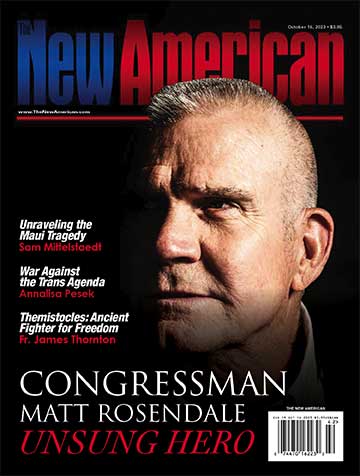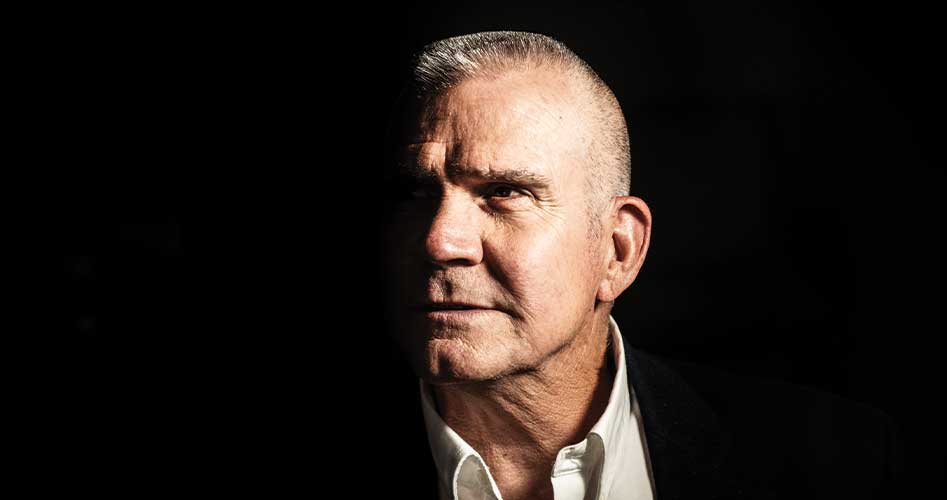Congressman Matt Rosendale: Unsung Hero
Matt Rosendale has been up since 4:00 a.m. He tells me this as he cracks open an energy drink. Earlier in the day, he tells me, Fox News’ Maria Bartiromo interviewed him. “She has me on when she wants the truth,” he says with a smile.
We are in the congressman’s Billings, Montana, office, a discreet second-floor setup in the heart of the state’s most populous city. Montana is the fourth-largest state in the Union, yet it ranks 43rd in population. Just over 117,000 people live in Billings.
Like so many in Big Sky Country, Rosendale wasn’t born in Montana. He was born in Baltimore, Maryland. He grew up in Maryland before buying a ranch and moving to Montana in 2002. His political opponents have used this against him. In the 2018 U.S. Senate campaign against incumbent Jon Tester, one of the digs against Rosendale was the moniker “Maryland Matt.”
Rosendale lives on a ranch in Glendive, in the part of the state that isn’t normally featured in paintings and movies such as A River Runs Through It. He thinks like a Montanan. He understands the need for grazing rights and access. He’s a defender of gun rights, a proponent of cutting regulations, and a staunch advocate for capitalizing on the abundant natural resources that lie beneath our feet. Montanans see him as an advocate for Montana values. They see him as a Montanan, and that’s why he’s been elected to various offices since 2010. He was first elected to Congress in 2020 and won reelection in 2022.
Rosendale is also one of the most constitutionally faithful lawmakers in Congress. So far, he has a perfect Freedom Index score. He scored 100 percent in the 117th Congress and in the 118th Congress to date. He voted against the compromise debt-ceiling bill, against giving money to Ukraine, against military intervention in Syria, and against ESG rules applied to retirement plans. He’s also voted to shut down the Department of Education and to terminate the Covid-19 “national emergency” and forced vaccinations. He’s on the Natural Resources Committee, and has argued commonsense points in favor of fossil fuels.
But despite Rosendale’s impeccable voting record, despite his outgoing and genuine personality, he’s not as well known in conservative circles as firebrands such as Matt Gaetz, Marjorie Taylor Greene, Rand Paul, or even Andy Biggs. Rosendale, so far, remains an unsung hero of constitutionalism.
The future seems bright for this talented and principled legislator. He’s already eyeing the next rung up: the U.S. Senate. Although he hasn’t officially announced a run, his answer to my question about it suggests it is a likelihood.
The New American talked with Rosendale about a number of issues, including the attack on fossil fuels and agriculture, the persecution of Donald Trump, the Biden crime family, transgenders in the military, the war in Ukraine, his perfect Freedom Index score, and whether we’ll make it out of the current mess.
This interview was conducted by Paul Dragu, communications director for The John Birch Society and host of The New American TV.
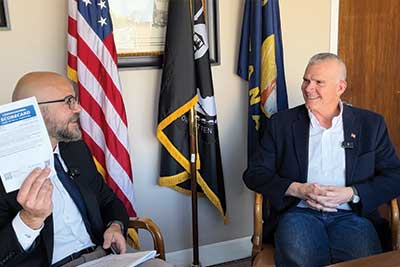
Paul Dragu with Matt Rosendale
The New American: Hey, everyone. Paul Dragu here, host of The New American Daily. And I’m in Billings, Montana, with U.S. Congressman Matt Rosendale. Congressman, thank you so much for taking the time to talk with us.
Representative Rosendale: Great to be with you today.
TNA: Congressman Rosendale represents the 2nd Congressional District here in Montana. He’s done so since 2020. And before that, going back to 2011, he served in various offices in Montana. But what really caught our eye about the congressman is his perfect Freedom Index score. The goal of the Freedom Index is to educate folks on how well or badly congressmen adhere to the Constitution. Congressman Rosendale is unusual in that he has a perfect Freedom Index score.
Congressman, as you know, Montana is a big agricultural state. Fifty-eight million acres are devoted to farming and ranching. That’s second only to Texas. But there also seems to be an attack on agricultural production. There’s a narrative saying that we need to reduce the number of cattle because their flatulence is destroying the atmosphere. There is an attack on fossil fuels, which are necessary for farmers to do their job on these massive thousand-acre farms that end up producing food for the rest of us. Is agriculture under attack?
Rosendale: Oh, absolutely. Whether we were discussing the “waters of the U.S.,” which is a rule that they tried to implement so that the federal government would be able to reach deep inside of your property and have control over dry ditches and mud puddles and say that they were perennial streams or some kind of a waterway that the Corps of Engineers would have some kind of jurisdiction over, or these very ESG standards that you’re talking about, which end up trying to impact the livestock that you’re raising or even the equipment that you use in order to grow your crops.
The most recent attack that we’ve seen is on some of the public lands across the state. And the Secretary of the Interior, [Deb] Haaland, has been directing the director of BLM to pass rules that are completely contrary to what is in statute as far as what those lands are supposed to be used for. They’re trying to elevate conservation measures and uses above agricultural and food production uses, which is a violation of the Taylor Grazing Act that’s been in place since the ’30s. It says that we need to make sure that we manage the land properly, but we need to make sure we produce food on them because we’ve got a nation to feed.
TNA: The Department of the Interior is looking at rules to restrict how we can use public lands. Is grazing under threat as part of that?
Rosendale: It is. They’re trying to elevate conservation measures — conservation easements, things like that — above the agricultural production of those lands. And then unfortunately, what I’ve seen is they’re also going around the statute and passing rules to completely disregard 70 years of the best range management practices — in some cases, promoting the reintroduction of buffalo into some of these areas, eliminating fencing, and things like that. Anybody who knows anything about range management says you have a rest rotation program, you raise animals, you move on, you have fencing to make sure that they’re grazing the area evenly so that you don’t destroy riparian areas, overgraze areas, and allow weeds to grow. So they’re going around the statute and trying to pass rules that are removing production agriculture from the landscape.
TNA: And that would affect the overall production of food for Americans and the world in general, right?
Rosendale: Right. It does. And it also absolutely has a devastating impact on the communities that have been based upon agriculture for the last century, where they have gone. They have established these grounds, they have improved these grounds. And the communities, the schools, the stores, the car dealerships are all built around that agricultural production. And so, if now you’re going to eliminate that production, you’re going to basically eliminate towns and communities that are located throughout the state of Montana and other Western states.
TNA: There’s an attack on fossil fuels. What do you make of this idea that we can go away from gas and oil? And how is that going to have an impact?
Rosendale: First of all, it’s just not going to happen any time soon. Will someday, in the far distant future, you be able to reduce the amount of fossil fuels that we utilize? Possibly. But it’s not tomorrow. And so we’re going to need coal. We’re going to need oil. We’re going to need natural gas. And we have an incredible abundance of it here. And the thing about it is, Paul, that if you truly want to protect the environment, then you would demand that we would develop these resources here, because the United States does it cleaner, safer, more environmentally sound, and with better labor standards than any other place on earth. And all they’re doing by passing ESG standards, additional fuel consumption measures, [is] they’re making it more difficult for the folks that are producing our food. And then they’re also making the cost of energy much more expensive, which hurts those on the lowest end of the income scale the most, whether they’re putting gas in their car to try and get to work or whether they are trying to keep their home heated in the winter.
Home on the range: As a Montana rancher for more than 20 years, Representative Rosendale is acutely concerned about the Biden administration’s anti-agriculture and anti-ranching policies. (Cattle ranch near Helena, Montana, shown here.) (AP Images)
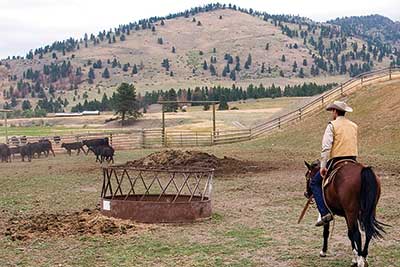
TNA: Now, you’ve said in public that Joe Biden is selling out the country. What is Joe Biden really selling? Is he a traitor? What is your take on these policies and what this administration is doing on energy? And obviously, there’s China. The House Oversight Committee has uncovered some pretty damning stuff. What is your take on this administration, and Joe Biden and his family in particular?
Rosendale: Well, I think that it’s the Biden crime family. I’ve said that publicly. Any time that they start bringing all of the banking records (and the oversight committees have been able to do that) and show that between himself, his son, and other members of the family, they have received funds from China and Kazakhstan and Russia and Ukraine (Go figure!), this is a major, major problem. He was involved in conversations about the businesses that they were paying these funds to. He is compromised. He’s compromised mentally, let’s be real. He’s compromised mentally, but he’s also compromised from a national-security standpoint. I do believe that. And I do believe that there will be a resolution brought forward to begin the impeachment inquiry.
TNA: What do you make of the indictments against President Trump? You’ve called them a sham. Since you’ve done that, he’s been indicted. He’s got his mug shot running around. He’s making lots of money off of this. But where is this going?
Rosendale: It’s disappointing. Equal justice under the law has got to be more than a slogan in this country. And when we see this Department of Justice going after Catholics for attending Latin Mass, when we see the Department of Justice going after parents because they want to participate in the school board meetings for their children, when we see the IRS send 20 fully body-armored agents with AR-15s, this is not equal justice under the law. And then you look at the different charges that had been brought up and indictments [that] have been brought up against President Trump, and you say, what were they built upon? They were built upon bias from completely tainted prosecutors, [and] are now being brought before venues that were completely biased against the president. And people are saying, what’s wrong with this? And I continue to try and give hope to the people across our nation that we don’t charge and prosecute in Congress. What we do is provide oversight and we grant the funding. They say, well, you have the purse strings. You can stop funding of these agencies. Well, if we go through the proper appropriations process, we have the first step towards doing that. First, we have to get the proper appropriations process started. And after we perform that task, it still is up to the Senate to approve the appropriations that we put forward and the president to sign into law. But the best way for that all to work is to have strong, committed, principled individuals in the House of Representatives that are putting the nation’s interest above their own.
TNA: Why are they so terrified of Trump?
Rosendale: Because he is not part of the “uniparty.” Because he, like myself, will call anybody out, Republican or Democrat, if they’re not doing their job, if they’re not upholding their oath of office. And that horrifies those people. When he says he wants to put America first, there are too many globalists and “uniparty” folks that are serving in Washington right now that put their household first. And therein lies the problem.
TNA: Does the “uniparty” work toward some sort of globalist governance system?
Rosendale: Whether they are working towards a global governance system or whether they are working towards just making sure that the funding all flows to maybe a globalist funding mechanism, is at minimal [their objective].
TNA: Speaking of funding, you voted against appropriating more money for Ukraine. We keep pouring money into Ukraine regardless. What should the U.S. position be on Ukraine? When does this stop?
Rosendale: I would like to say that the unprovoked invasion of Ukraine by Russia was wrong, and I have supported sanctions against Russia. As a matter of fact, it’s funny: Putin actually sanctioned me by name. So unfortunately, I’ll never be able to go to Russia. Shucks! So, I supported the sanctions to try and remove Russia from Ukraine. But what I do not believe is that the United States should be sending money — certainly not troops, certainly not the weapons to the extent that we have — to be involved in a conflict, when our very own southern border has been invaded to the tune of seven million people.
TNA: Is this administration intentionally letting that happen?
Rosendale: Yes. And that’s why Mayorkas absolutely needs to be impeached. He is the Secretary of Homeland Security and he is completely ignoring the rule of law. There’s been six million people that we know of, because they’ve had encounters with some type of law enforcement, Customs and Border Patrol or some other type of law enforcement. But we have another million and a half that have been picked up on some type of surveillance, video surveillance or whatever, that are dressed head to toe in camouflage and ghillie suits and sneaking in in the dark of night. So, let me ask you, Paul, if it is so easy to go to Eagle Pass, Texas, and cross into our country and throw your hands up and get clean clothes, new shoes and a bus ticket anywhere you want to go, how bad of a criminal do you have to be to sneak in somewhere else in the dark of night?
TNA: Why? What do they have to gain from this? It seems intentional. What does this administration have to gain from an open-borders policy?
Rosendale: I think that their intention is to create a permanent underclass that is dependent upon the government. When we had immigration sort of taking place in the early 1900s, people had to be sponsored. They did not receive assistance from the federal government. They came in, they were sponsored, they took a job, and they came here for one reason, and that was for freedom. I have stood in the crown of the Statue of Liberty before 9/11, when you were allowed to go all the way up, and looked out over the harbor of New York and thought about the thousands and thousands of people that have come to our country and saw that statue and knew that they had arrived, and all they asked for was freedom just to be left alone. They didn’t ask for a social program. They didn’t ask for a wind farm subsidy. They just asked to be allowed to pursue their full potential. And so right now what we have are people that come in (and some of them are well intentioned, I know), and immediately they’re given a cellphone and assistance from the federal government. And the Democrat Party wants to create a permanent dependent underclass.
TNA: My family is one of those families that you just described. I was born in communist Romania. My parents worked really hard to try to get out. You mentioned the Statue of Liberty. We landed in New York and my dad got on the ground and he kissed the ground and he cried when he saw that. This country’s not like what it used to be. Can we get it back?
Rosendale: Absolutely we can. It takes committed individuals. There are too many people that run for office because they pursue a career in politics. Once politics becomes your career instead of public service, every vote that you cast becomes tainted. We must return to having politics be public service. Ninety percent of the people that are serving there now have never had a job outside of government. And that is a major problem.
TNA: We started out by introducing you as someone who has a perfect Freedom Index score. The reason we highlight that is because it’s rare.
Rosendale: I’ve been called special! [laughs]
TNA: But why is that? I mean, here you have someone who one day you may potentially run against. You may have heard of him, [Montana] Senator Jon Tester. His lifetime [Freedom Index] score is 21 percent, and the last session was 30 percent.
Rosendale: He’s getting better. It’s getting closer to election season!
TNA: What’s so hard about adhering to constitutional principles? Do the congressmen not read the Constitution, or is it the lobbying? Is it the payouts? What’s happening?
Rosendale: Again, I truly believe that once you make the decision that this is going to be a career — instead of a public service, where you’re going to be here for a while and then return home — and it goes beyond that, your every vote becomes tainted. And if you take every single vote and you block out all of the background noise and only focus on whether it is constitutional, [asking yourself] what the impact of this is going to be, and if I didn’t have any other pressures being placed upon me, how would I vote on that? The people aren’t voting that sincerely.
TNA: How come you’re doing it?
Rosendale: Because I would be glad to go back and join my children and my grandchildren and be back at the ranch. I cannot go back to them with a straight face, if I had not done everything that I possibly can to restore (not to re-create!) our Republic.
TNA: You recently voted for H.R. 5, which would terminate the Department of Education. You mentioned your children. Why would you want to get rid of the Department of Education?
Rosendale: Because they do a bad job. I don’t think it’s constitutional. I don’t think there’s anywhere in the Constitution that says that the federal government should be funding the Department of Education. This is another part of the government that gives assistance to the states. And once [states] become reliant upon it, [the federal government places] additional mandates upon them in order to continue to maintain that assistance, [saying] “Here are the things that you have to do.” We see that in many cases in many parts of the government. And the states can function much better. They are closer to the people. This is what the Founders intended. And they can deliver the services, state to state, that the people within that state choose to offer. Right now, the state of Montana’s budget is about $7 billion a year. Of that, about 48 percent comes from the federal government. Do they really have a balanced budget? Because guess what? The federal government is providing 48 percent of the revenue that’s necessary for the state to function.
TNA: Some would call that a nanny state.
Rosendale: Yeah. A big portion of what we are spending now is actually borrowed.
TNA: Can Montana take care of its own?
Rosendale: It could. See, here’s the deal. We have the people, we have the resources, and we certainly have the academic ability to provide for our own state. However, the regulatory state that has been imposed upon us by the federal government really is what keeps us from doing so.
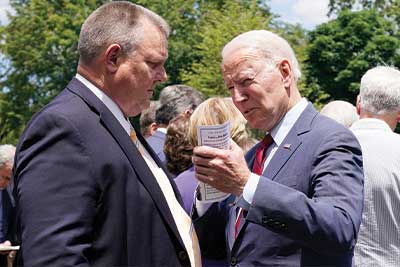
Possible rival: Although Representative Rosendale has not yet decided whether to challenge Montana Senator Jon Tester (shown here with President Biden) next year, it is certain that the only thing the leftist Democratic senator has in common with Rosendale is his hairstyle. (AP Images)
TNA: More than 10 years ago you started out in politics, and now they’re actually allotting taxpayer money to fund military personnel’s sex changes. Did you ever think this is where we would be in 10 years? And what do you make of this?
Rosendale: People who are not closely following the debates that take place in Congress say, How come the parties are so far apart from each other? Why is it so divisive? Why can’t you find common ground like Tip O’Neill and Ronald Reagan used to do? And I will tell you why: Because Tip O’Neill and Ronald Reagan, in their discussions, were [saying], “Are we going to buy 500 tanks or are we going to buy 1,000 tanks?” They were not discussing if the Department of Defense was going to pay for transgender surgeries to take a man and give him the features of a woman and then pay millions of dollars for the psychological treatment for many years thereafter. The Department of Defense paying for that is beyond the understanding of anybody that I know.
TNA: Should these people be in the military in the first place?
Rosendale: As I stood up on the House floor and said, and I will say it here again, if you don’t know if you’re a man or a woman, you should not have your hand on the button that’s going to launch missiles.
TNA: Well, this seems self-evident, but does Congress recognize this, or does everyone on the Left believe this, or is it a front?
Rosendale: There are so many people who are easily intimidated by the very, very vocal minority. It stuns me. For people to go through an election, which typically is not an easy process to go through — the debates, the discussion — and then be so intimidated by a very, very vocal minority (that is wrong!), I don’t understand it.
TNA: So, on the record, Congressman Rosendale, do you plan on running against Senator Jon Tester?
Rosendale: I have to consider it. When I was elected to the [state] legislature in 2010, I did not seek out the office. I truly didn’t. My community came to me, and they said, “You’ve been hiding out here on the ranch for a few years, and you’ve got skills that are not being utilized.” And I was raised in a family where, if you have the ability to do something, you have the responsibility to do it. My dad had a newspaper when I was a kid, a weekly newspaper. And I grew up in the newspaper industry, and I’ve just tried to serve my community in the position that I can be the most effective for them. Jon Tester does not represent Montana. I don’t know what Jon did 18 years ago when he first got in, but Jon now votes with the ESG standards. Jon votes to shut down our energy. Jon votes to promote the transgender surgeries in the Department of Defense. Jon voted for ObamaCare and came out and told everybody that they were going to be able to keep their policies. I was the insurance commissioner for Montana from 2016 until 2020. You weren’t allowed to keep your policy. That was a flat-out lie, and they all knew that was a flat-out lie. So, I am certain at this point that Jon will be replaced in ’24. And just last week, 39 local legislators, state legislators, including the speaker of the Montana House and the president of the Montana Senate, sent a letter out, and they are supporting me. They’re encouraging me to run for the Senate. But I have a wife and children, and now I’ve got two granddaughters up in Great Falls. And we’re having this discussion. And so, I will discuss it with my family. I will prayerfully consider it, and we have a lot of time. People try to impose deadlines, and I say, look, the deadline isn’t until March 11th of next year. But here’s what I’ll tell you: The people across Montana, they know what’s going on. And what I will guarantee you is, they’re going to decide who’s going to be the next senator, not Mitch McConnell and the D.C. cartel.
TNA: Let’s finish up with this. A lot of time when I talk to legislators, it seems pretty dismal. We talked about military personnel who want sex changes. We have a massive fiscal problem and all of these things. But why should Americans be hopeful, and what should they do? What can constituents do to help get our country back on track?
Rosendale: So, I think that what we proved the first week of January when we went through the speaker’s battle is that a small group of principled, committed individuals can make a difference. We saw it in the Revolutionary War. Not everybody in our country supported breaking away from England. You had 30 percent, 35 percent, which I’ve heard is the highest percentage of the Colonists that said, we want our independence.
TNA: We have more than that who want America back on track, for sure.
Rosendale: Exactly. And so, what they have to do is be vocal. They have to participate. Because the only way that our system does work is if the constituents participate. I can’t do it all by myself. The constituents from Wyoming and from Kansas and from South Carolina and from New Hampshire have to contact their representatives and say, “We don’t think that the Department of Defense should be focused on paying for transgender surgeries. They should be focused on defending our country. We don’t think that Homeland Security is doing their job by allowing six million known illegals to come into our country over the last two years under the Biden administration.” I need those voices to rise up.
TNA: We need more involvement. Are we getting out of this?
Rosendale: Absolutely we are. It’s going to be messy. We’ve got another 20 months of the Biden administration and it’s going to be messy. But there is still a small group of very committed, principled individuals who are going to fight. We’re not going to sign off on this out-of-control spending. We’re not going to sign off on these out-of-control policies that are destroying our nation. And come join us.
TNA: Congressman, thank you so much for your time.
Rosendale: Thank you. Thanks for having me on, Paul.

